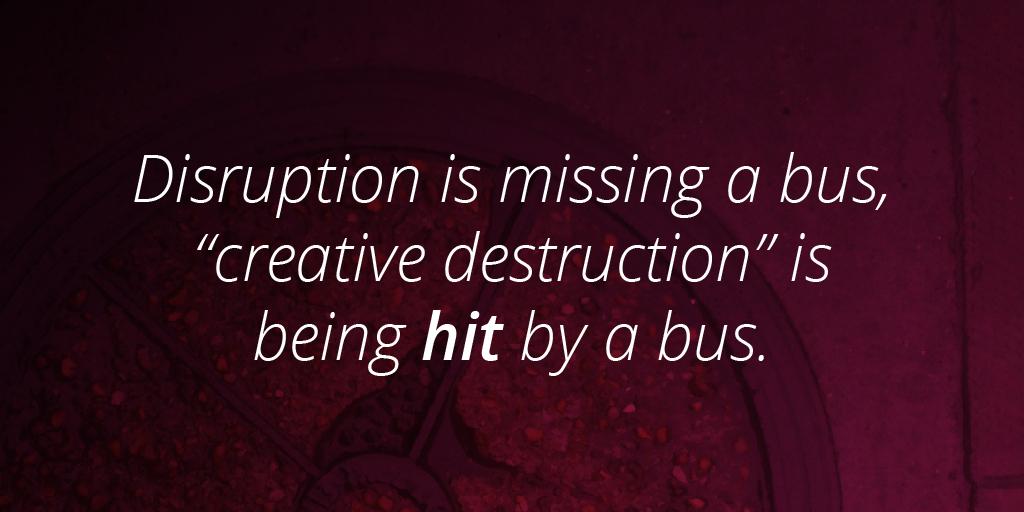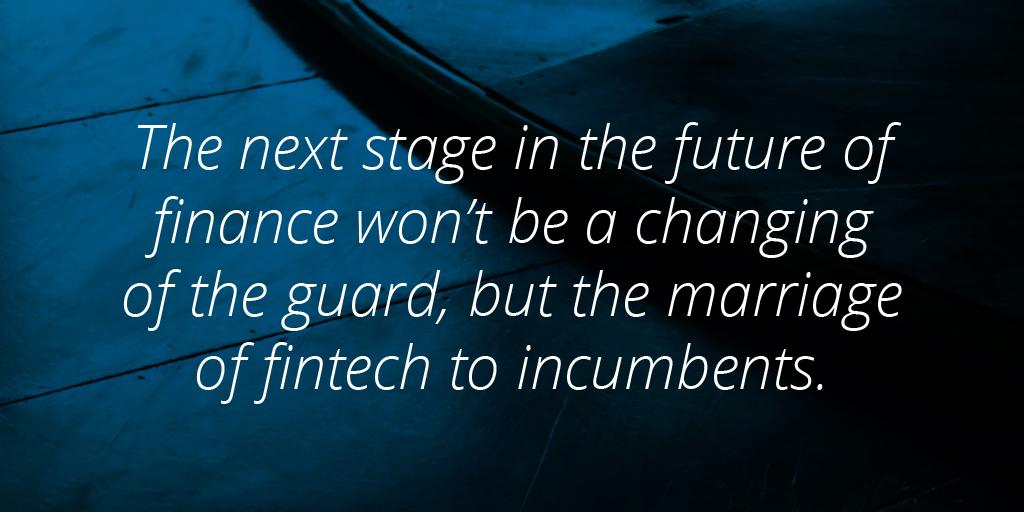
Orthodoxy Taketh, and Orthodoxy Giveth: The “New” New Financial Orthodoxy
As we saw in Part I, financial orthodoxy isn’t in danger of being overthrown by technology any time soon. If anything, the biggest challenge to orthodoxy comes from policy makers.
The next stage in the future of finance won’t be a changing of the guard, but the marriage of fintech to incumbents. Fintech innovators and established players are finding it more advantageous in working together than in competing against each other.
Originally intent on disrupting banks, P2P lenders are now selling their loan portfolios to them. Banks are buying new fintech companies to juice their commercial and residential loan books, and eventually replace their legacy loan technologies. Wealth management firms are developing their own robo-advisor technology.
Like all marriages, the one between incumbent and upstart goes both directions: the backers, boards and leadership of P2P lenders have long been dominated by institutional capital and executives. The future of fintech isn't outside the establishment, because fintech is already on the inside in one form or another.
FinTech is shaping up less to be a model of disruption or displacement of incumbents by start-ups, and more like the divide between utility and risk in the pharmaceuticals industry. Big Banks are in the same position as Big Pharma: utility businesses that efficiently produce, market and distribute products or services that rely on start-ups (via M&A) and contract research organizations for R&D.
Through investment or infiltration, they have a call option on a wide range of R&D, rather than needing to take a long position in a narrow few. The low-risk capital that invests in utility financial services doesn’t want—or need—to be commingled with high-risk capital in frontier activities.

What a “New Financial Orthodoxy” Looks Like
Overcoming the establishment in large, long-lived markets takes immense energy and societal will. The word “disruption” doesn’t measure up: disruption is missing a bus, “creative destruction” is being hit by a bus.
Change of this magnitude is costly, painful and controversial. So what does a change in financial orthodoxy really look like?
More Fairness in Finance
Finance could more equitably distribute economic benefits. Fintech can make investing less like a clubby casino and more like a boring utility, fractionalizing any asset with extraordinarily little overhead and driving transaction costs down to fractions of pennies.
It isn't difficult to imagine buying a sliver of a bond that is a sliver of a claim on hundreds or even thousands of slivers of cash flows associated with rent or dividends payments. Recorded on a distributed ledger, risks could be assessed in real-time using the fully transparent data of assets and entities, providing near-continuous cash flow distribution via smart contracts.
The big promise of fintech is democratization. Finance already has a bad habit of privatizing gains while socializing losses; fintech could be a force that more broadly socializes the gains.
Unfortunately, the headwinds are enormous. First, complexity doesn't go down, it goes up. Current regulation would be an obstacle both to the bonding (one compliance slip and the issuer is out of business) and to the buying (very few buyers could truthfully admit to understanding the risks of the thing). Not to mention that the size of the disclaimer for that bond and its bundled cash flows would be overwhelming.
Second, it might sound transformative to offer investment opportunities for people who can only squirrel away $5 a week, but for people who have low tolerance for that $5 becoming $4 as a result of principal erosion, investing is scary. Money deposited in a bank doesn't earn much, but it's insured to a certain amount.
To encourage people to move money out of retail deposits, they need to have principal protection. To some legislators, giving a limited amount of "principal protection" to investors below certain income levels might sound like a more appealing form of "helicopter money", but it's still a huge policy wall to climb. That means a “socialization of finance” is less a technology-led revolution than a policy-led one.
Less Risk in the Financial Economy
Finance could be made less risky if its principal actors, banks, got out of the business of maturity transformation, and didn’t accrete hidden risks through transaction netting. The former is accomplished by full-reserve banking (banks hold 100% of the deposits they accept, backed by sovereign debt), the latter through real-time gross settlement (regulators can monitor risks in the system all the time).
The upside? No bank runs, no government deposit insurance, no bank bailouts, and less risk to the real economy by virtue of problems in the financial economy. These are the theoretical benefits of cryptocurrencies on distributed ledgers. Much of this can be accomplished more modestly with or even without distributed ledger technology shared among chartered financial institutions.
Solving one problem generally leads to others. Bank deposits wouldn't earn interest and depositors would be charged convenience fees for services and transactions (not that anybody would notice in the low interest rate world of the last decade). The real problem is lenders—and lending practices—would change.
A lot of crypto-currency advocates talk about Bob and Alice exchanging apples for Bitcoin. Which is great, but most western economies run on credit, not debit. No worries: why not create tech that grants instant credit for Bob (instantly securitizing it, naturally) so the wheels of GDP go uninterrupted in the event he's short a few coins for his snack?
Lending would move toward (currently) unregulated providers. Given how they function today there's good reason to believe high-risk borrowers would be charged predatory rates, thwarting the intent of fair lending regulations and amplifying credit cycles in the process.
Gross settlements are no panacea, either, because they trade credit risk (somebody ends up short after net and needs a loan to tide them over) for liquidity risk (the ability to backstop each and every transaction requires a lot of lucre). When markets become afraid of a liquidity crisis—and we all share the same ledger, so everybody, not just regulators, can monitor that—they tend to hoard receipts.
Once Alice uses the money she received from Bob to pay for those Honeycrisp apples she bought from Farmer Joe, she's not getting it back. If she's worried her customers (who all use insta-credit) seem to be down on their luck in recent weeks, she may hesitate to pay Joe, for the comfort of having liquidity.
As we learned in 2008—and more recently, as start-up fintech marketplaces without a buyer of last resort have learned—liquidity crises are seismic events.

Digital Rights For All
Personal information and usage data are the currency of the social-digital economy. Yet it’s given away by users and currently, only monetizable by service providers. Those providers make money in a form of arbitrage, giving users access to something of value (social media platforms) in exchange for something of greater value (rights of data and expectations of privacy). Current runaway arbitrage conditions are fueling a concentration of wealth in the social economy that defies sustainability.
Any business built on asset arbitrage is doomed because the asset owners eventually figure out the value of what they’re trading away and demand fair compensation. Creating a registry of digital rights—where each person can price, license and be compensated for use of their data—is possible with a blockchain ledger.
Of course, digital economy companies aren’t showing any signs of willingness to part with their data assets. Sharing rights isn’t in their interests, and they’ve been able to maintain control over the terms and conditions governing usage of the digital exhaust those platforms generate.
This brings us back to our conclusion in part I: only social and regulatory change can overcome this orthodoxy, not technology alone. Any mechanism for compensating individuals for their IP will go absolutely nowhere without legal and regulatory backing to indoctrinate and enforce those rights.
Orthodoxy is Dead. Long Live Orthodoxy!
"Disruptive" technology that sweeps out incumbents, regulation and policy with it ultimately amplifies risks via technological complexity. Overthrowing financial orthodoxy sounds appealing in the long wake of the 2008 financial crisis, but not if it denies lessons learned the hard way and codified in business and regulatory policy.
As capital markets’ technology intensity increases, it merely shifts financial inequality to those most adroit in technology, not reduce it overall. At worst, it will also create unforeseen, new risks that are poorly understood leaving scant tools to manage or mitigate their impacts.
It’s exciting to think that new technology and the optimism and idealism it fosters can solve deep rooted and complex economic, social and legal challenges. A single-axis solution like technology, though, isn’t a silver bullet providing robust solutions. Technology will figure prominently in solutions as its strategic role in finance continues to grow.
Things are made reality through technology only when society is ready for it or policy mandates it. Until then, the best tech can do is reduce rents extracted from buyers and sellers—something finance has a long history of doing with tech.
Disclaimer: The statements and opinions expressed in this article are those of the author(s) and do not necessarily reflect the positions of Thoughtworks.














